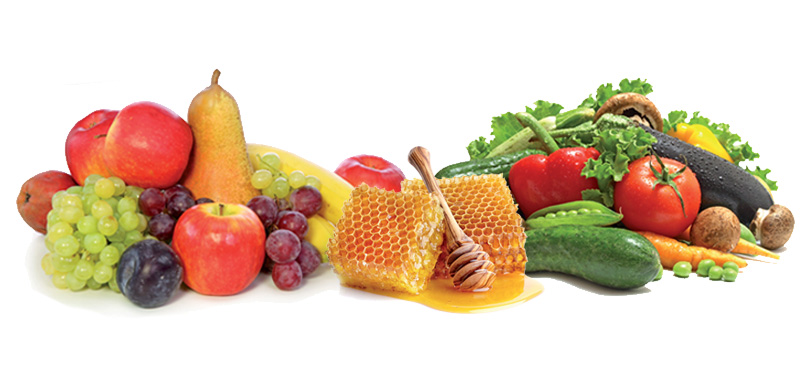• Vitamin D :
 In France, 80% of the population has an inadequate intake of vitamin D*. Most immune cells express vitamin D receptors. Most notably, vitamin D amplifies the action of phagocytose, a mechanism that enables a particular immune cell to integrate and destroy a pathogen. It also triggers the production of anti-microbial molecules.
In France, 80% of the population has an inadequate intake of vitamin D*. Most immune cells express vitamin D receptors. Most notably, vitamin D amplifies the action of phagocytose, a mechanism that enables a particular immune cell to integrate and destroy a pathogen. It also triggers the production of anti-microbial molecules.
* ENNS (National Nutrition Health Study) 2006-2007
 And on the plate? Oily fish (salmon, sardines, anchovies), cod liver, eggs, offal
And on the plate? Oily fish (salmon, sardines, anchovies), cod liver, eggs, offal
• Vitamin C :
 Vitamin C stimulates the proliferation and activation of all the lymphocytes and the production of antibodies. It also blocks the elimination of T lymphocytes, sustaining the infection response.
Vitamin C stimulates the proliferation and activation of all the lymphocytes and the production of antibodies. It also blocks the elimination of T lymphocytes, sustaining the infection response.
 And on the plate? Citrus fruit, guava, blackcurrant, papaya, kiwi fruit, peppers, cabbage, spinach…
And on the plate? Citrus fruit, guava, blackcurrant, papaya, kiwi fruit, peppers, cabbage, spinach…
• Cooper :
 Copper also increases the phagocytic power of the immune cells, hence its anti-microbial action. It also helps to reduce inflammatory reaction.
Copper also increases the phagocytic power of the immune cells, hence its anti-microbial action. It also helps to reduce inflammatory reaction.
 And on the plate? Liver, seafood, wholegrain cereals, dark chocolate…
And on the plate? Liver, seafood, wholegrain cereals, dark chocolate…
• Manganese :
 Manganese is required for the synthesis of antibodies. It also plays a role in controlling the inflammatory response and allergies.
Manganese is required for the synthesis of antibodies. It also plays a role in controlling the inflammatory response and allergies.
 And on the plate? Spices (saffron, curry, cinnamon), wholegrain cereals, soya…
And on the plate? Spices (saffron, curry, cinnamon), wholegrain cereals, soya…
Honey, propolis, royal jelly… products from the beehive have been exploited down the ages for their many virtues.  They notably have positive effects on the body's natural defences. Propolis, for example, is a resin used by bees to line their hive for disinfection purposes.
They notably have positive effects on the body's natural defences. Propolis, for example, is a resin used by bees to line their hive for disinfection purposes.
 Royal jelly is the food exclusively reserved for the queen: it is hardly surprising that she grows bigger and lives longer than all the other bees in the hive…
Royal jelly is the food exclusively reserved for the queen: it is hardly surprising that she grows bigger and lives longer than all the other bees in the hive…
Rich in vitamins, minerals, essential amino acids and phenolic compounds with anti-microbial virtues, products  of the beehive are therefore an excellent natural means of stimulating the natural defences and protecting against infectious attack.
of the beehive are therefore an excellent natural means of stimulating the natural defences and protecting against infectious attack.
• Glutamine to repair the intestinal barrier :
 An amino acid acting as a fuel for the cells of the mucous membrane, glutamine helps to maintain and repair the intestinal barrier. It sustains impermeability.
An amino acid acting as a fuel for the cells of the mucous membrane, glutamine helps to maintain and repair the intestinal barrier. It sustains impermeability.
 And on the plate? Protein-rich food: meat, eggs and fish.
And on the plate? Protein-rich food: meat, eggs and fish.
• Rebalance the intestinal immunity and the microbiota using probiotics :
 According to the WHO, probiotics are "living micro-organisms which, when administered in sufficient quantity, exercise a beneficial effect on the health of the host." Such micro-organisms therefore transit the digestive tract and mainly act on the intestinal mucosa and microbiota.
According to the WHO, probiotics are "living micro-organisms which, when administered in sufficient quantity, exercise a beneficial effect on the health of the host." Such micro-organisms therefore transit the digestive tract and mainly act on the intestinal mucosa and microbiota.
The lactic bacteria (transforming carbohydrates into lactic acid, hence the name) are the main probiotics. Lactobacilli and bifidobacteria are the most frequently used.
Probiotics have multiple essential actions in support of intestinal immunity. They first of all help to maintain a balanced intestinal microbiota. They strengthen the intestinal barrier thanks to their significant ability to adhere to the muscosa and inhibit the adherence and growth of pathogens by competing for their fixation locations on the intestinal wall.
Finally, they control the intestine's immune cells and promote the production of antibodies, released in the intestinal lumen to prevent the entry of infectious bacteria or viruses in the mucosa.
 And on the plate? Probiotics are mainly found in yoghurt, fermented milk (kefir, ribot), raw pickled cabbage…
And on the plate? Probiotics are mainly found in yoghurt, fermented milk (kefir, ribot), raw pickled cabbage…
• Prebiotic fibres, the preferred food of the probiotics !
 The prebiotics are a group of fibres that have the particular property of serving as food for the intestinal microbiota. They help to strengthen the flora and the intestinal barrier.
The prebiotics are a group of fibres that have the particular property of serving as food for the intestinal microbiota. They help to strengthen the flora and the intestinal barrier.
Prebiotic fibres are metabolised by the microbiota into different compounds, including short-chain fatty acids (SCFAs) such as butyrate. This molecule is essential for maintaining the intestinal barrier as it serves as a nutrient for the cells that make up the mucosa.
The beneficial effects of the prebiotics are therefore complementary to the effects of the probiotics.
 And on the plate? The prebiotics are found in cereals, fruit and vegetables, such as wheat, onion, garlic, leeks, asparagus, bananas, artichoke and Jerusalem artichoke.
And on the plate? The prebiotics are found in cereals, fruit and vegetables, such as wheat, onion, garlic, leeks, asparagus, bananas, artichoke and Jerusalem artichoke.
Think about plants !
Although they do not have an immune system, plants protect themselves against pathogenic micro-organisms via mechanisms that notably involve phenolic compounds, molecules with anti-microbial properties.
Numerous plants are known for their anti-infection properties: thyme, rosemary, walnut leaves, ginger, mallow flower, tea tree, peppermint, etc. They can be used in the form of essential oils, highly concentrated into active substances. Echinacea is also known for its contribution to supporting the immune system.


 They notably have positive effects on the body's natural defences. Propolis, for example, is a resin used by bees to line their hive for disinfection purposes.
They notably have positive effects on the body's natural defences. Propolis, for example, is a resin used by bees to line their hive for disinfection purposes. Royal jelly is the food exclusively reserved for the queen: it is hardly surprising that she grows bigger and lives longer than all the other bees in the hive…
Royal jelly is the food exclusively reserved for the queen: it is hardly surprising that she grows bigger and lives longer than all the other bees in the hive… of the beehive are therefore an excellent natural means of stimulating the natural defences and protecting against infectious attack.
of the beehive are therefore an excellent natural means of stimulating the natural defences and protecting against infectious attack. An amino acid acting as a fuel for the cells of the mucous membrane, glutamine helps to maintain and repair the intestinal barrier. It sustains impermeability.
An amino acid acting as a fuel for the cells of the mucous membrane, glutamine helps to maintain and repair the intestinal barrier. It sustains impermeability. According to the WHO, probiotics are "living micro-organisms which, when administered in sufficient quantity, exercise a beneficial effect on the health of the host." Such micro-organisms therefore transit the digestive tract and mainly act on the intestinal mucosa and microbiota.
According to the WHO, probiotics are "living micro-organisms which, when administered in sufficient quantity, exercise a beneficial effect on the health of the host." Such micro-organisms therefore transit the digestive tract and mainly act on the intestinal mucosa and microbiota. The prebiotics are a group of fibres that have the particular property of serving as food for the intestinal microbiota. They help to strengthen the flora and the intestinal barrier.
The prebiotics are a group of fibres that have the particular property of serving as food for the intestinal microbiota. They help to strengthen the flora and the intestinal barrier.